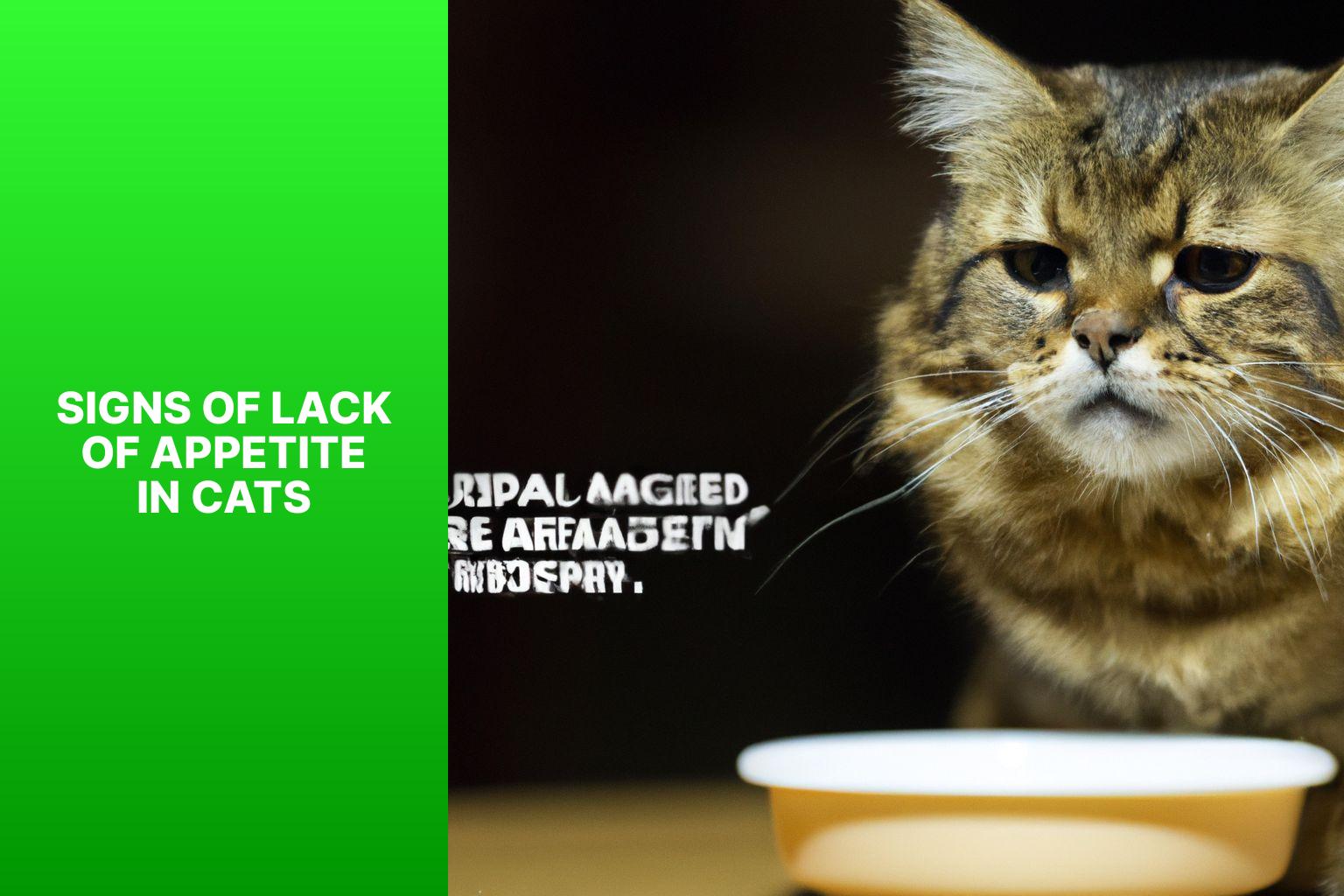It is a well-known fact that cats are generally finicky eaters, but what happens when their appetite disappears entirely? How long can a cat go without eating? The answer to this question varies depending on several factors.
Factors Affecting a Cat’s Ability to Go Without Eating:
There are various factors that can impact a cat’s ability to go without eating. These include age, overall health, underlying medical conditions, stress levels, and environmental changes.
Signs of Lack of Appetite in Cats:
Recognizing the signs of a lack of appetite in cats is crucial. Common signs include weight loss, lethargy, vomiting, diarrhea, and a disinterest in food.
Potential Causes of Loss of Appetite in Cats:
Loss of appetite in cats can be caused by several factors, including illness or pain, stress or anxiety, dental issues, and certain medications.
Consequences of Prolonged Lack of Eating in Cats:
Prolonged lack of eating in cats can have serious consequences. Cats are prone to a condition called hepatic lipidosis, also known as fatty liver disease, which can be life-threatening if not addressed promptly.
When to Seek Veterinary Care?
If your cat refuses to eat for more than 24 hours, it is crucial to seek veterinary care immediately. A veterinarian can assess the underlying cause of the loss of appetite and provide appropriate treatment.
Tips to Encourage a Cat to Eat:
There are several strategies to encourage a cat to eat, such as offering a variety of foods, warming the food to enhance aroma, providing a quiet and stress-free environment, and trying different feeding methods. It is essential to consult with a veterinarian for guidance tailored to your cat’s specific needs.
Understanding the factors affecting a cat’s ability to go without eating, recognizing the signs of loss of appetite, and knowing when to seek veterinary care can help ensure the well-being and health of your feline companion.
Key takeaway:
- A cat can typically go without eating for a maximum of 2-3 days.
- Several factors can affect a cat’s ability to go without eating, including illness, stress, dental issues, and medications.
- Prolonged lack of eating in cats can lead to serious consequences and should prompt veterinary care.
How Long Can a Cat Go Without Eating?
Discover the fascinating world of how long a cat can go without eating. Uncover the factors that can influence a cat’s ability to sustain themselves without a meal. From environmental conditions to a cat’s health and age, delve into the intricate details that impact their survival. Prepare to be amazed by the resilience and adaptability of our feline friends as we unravel the secrets behind their extraordinary ability to go without food.
Factors Affecting a Cat’s Ability to Go Without Eating
The factors that affect a cat’s ability to go without eating are age, health condition, and stress levels.
– Age: Kittens have smaller stomachs and higher metabolic rates, so they need to eat more often than adult cats. Older cats may have a reduced appetite due to age-related issues.
– Health condition: Cats with certain medical conditions, such as kidney disease or dental problems, may have a reduced appetite. Pain or discomfort can also affect their ability to eat.
– Stress levels: Cats are sensitive creatures, and stress can lead to a loss of appetite. Changes in the environment, routine, or the presence of other animals can cause stress for a cat.
A true story about a senior cat named Charlie highlights the importance of these factors. At 15 years old, Charlie started experiencing a loss of appetite. His owner took him to the veterinarian, who diagnosed him with kidney disease.
The vet explained that Charlie’s reduced appetite was due to his kidneys not functioning properly. The owner received instructions on a special diet and medications to manage Charlie’s condition. With proper care and monitoring, Charlie’s appetite gradually improved, and he regained his strength.
This story shows how age, health condition, and stress levels can significantly impact a cat’s ability to eat. It emphasizes the importance of seeking veterinary care when a cat’s appetite decreases, as it could indicate an underlying issue that needs attention.
Signs of Lack of Appetite in Cats
Photo Credits: Www.Catcornerblog.Com by Eric Brown
If you notice any signs of lack of appetite in your cat, such as cats refusing to eat their regular food, weight loss or muscle mass loss, lethargy or lack of energy, changes in behavior like hiding or avoiding social interaction, abnormal drinking habits, either excessive drinking or not drinking at all, dull or unkempt coat, vomiting or diarrhea, bad breath or dental issues, reduced grooming or neglecting personal hygiene, or decreased interest in playing or engaging in usual activities, it is important to consult with a veterinarian.
Lack of appetite in cats can indicate an underlying health issue, and prompt medical attention is necessary to determine the cause and provide appropriate treatment for your cat’s well-being.
Potential Causes of Loss of Appetite in Cats
Discovering the reasons behind a cat’s loss of appetite is crucial in ensuring their well-being. In this section, we will explore various factors that could potentially contribute to this phenomenon. From illness or pain, stress or anxiety, dental issues, to medications, we’ll shed light on each aspect that might impact a cat’s desire to eat. By understanding these potential causes, we can take proactive steps to address them and ensure our feline friends maintain a healthy and balanced diet.
Illness or Pain
Illness or pain can greatly impact a cat’s appetite and willingness to eat. Cats may experience a decrease in appetite due to various health conditions or physical discomfort. It is not uncommon for cats to lose their desire to eat when they are in pain, whether from injuries, infections, or underlying illnesses. Dental diseases or gastrointestinal problems can also cause discomfort while eating, resulting in a decrease in food intake. Cats with kidney disease, liver disease, or cancer may experience a loss of appetite.
It is crucial to closely monitor any significant changes in a cat’s eating habits, as they could be an indication of underlying illness or pain. If a cat consistently refuses to eat for more than 24-48 hours, it is vital to seek veterinary care promptly. This way, the underlying cause can be identified and appropriate treatment can be provided. Seeking medical attention in a timely manner can help alleviate pain or discomfort and prevent any potential complications.
When a cat exhibits signs of illness or pain, it is essential to ensure easy access to food and water, as well as create a quiet and comfortable environment. Offering soft or wet foods can be beneficial for cats experiencing dental pain or mouth discomfort. It is always best to consult with a veterinarian to determine the best course of action and address the specific needs of the cat in such situations.
Stress or Anxiety
Stress or anxiety can have a significant impact on a cat’s appetite. It is not uncommon for cats to go without eating for long periods due to these conditions. To mitigate this issue, it is important to identify the causes and take appropriate measures.
There are several factors that can contribute to stress in cats. Environmental changes, such as moving or introducing new pets, can trigger anxiety in felines. By providing a calm and stable environment, it is possible to alleviate their stress levels.
Routine disruptions can also be a source of stress for cats. These creatures thrive on consistency and disruptions in their daily routines can cause anxiety. Maintaining a regular feeding schedule and creating a secure feeding area can help reduce their stress levels.
Cats are solitary animals by nature, and excessive social interactions or conflicts with other pets can induce stress. To ensure their well-being, it is important to provide separate spaces for cats and to facilitate peaceful interactions with other animals in the household.
Environmental enrichment is crucial in alleviating stress and anxiety in cats. Engaging them in play, providing stimulating toys, and creating safe hiding spots can help distract them from their worries.
Comforting techniques, such as using calming pheromone diffusers or natural remedies, can also be effective in reducing stress levels in cats.
If stress or anxiety persists, it is crucial to consult a veterinarian. They can rule out underlying medical conditions and explore appropriate treatment options for the cat.
Addressing stress or anxiety in cats is essential for maintaining their overall health and well-being. By understanding the causes and implementing appropriate strategies, cat owners can help their furry companions overcome these challenges and regain their appetite.
Dental Issues
- Dental problems can affect a cat’s appetite and eating habits. Cats with dental issues may experience pain or discomfort while chewing, leading to a decreased interest in eating. Common dental problems in cats include periodontal disease, tooth decay, and tooth resorption.
- Signs of dental issues: Watch out for signs that indicate dental problems in your cat. These may include bad breath, drooling, reduced appetite, difficulty eating, pawing at the mouth, or blood in the saliva. If you notice any of these signs, consult a veterinarian.
- Causes of dental issues: Poor dental hygiene, inadequate nutrition, or genetics can contribute to dental problems in cats. Plaque and tartar buildup can lead to gum disease and tooth decay.
- Consequences of untreated dental issues: Untreated dental issues can result in more significant health problems for cats. Along with pain and discomfort, dental problems can cause infections, tooth loss, and difficulties in eating and grooming. They may also affect a cat’s overall health and well-being.
- Preventing dental issues: Regular brushing of a cat’s teeth, feeding a balanced diet, and providing dental treats and toys can help prevent dental problems. Routine dental check-ups and cleanings by a veterinarian are also important for maintaining good dental health in cats.
Medications
When giving medications to cats, it is important to consider their individual needs and possible side effects. Some key points to remember about cat medications are:
1. Dosage: It is crucial to give the correct medication dosage based on the cat’s weight and follow the instructions from the veterinarian. Adhering to the prescribed dosage is important to avoid any adverse effects.
2. Adherence: Cats can be picky eaters, which can make medication administration challenging. If your cat refuses to take medication, it is recommended to consult the veterinarian for alternative options such as flavored formulations or topical treatments.
3. Side Effects: Cats may experience side effects from certain medications, such as gastrointestinal upset, lethargy, or allergic reactions. If you observe any unusual behaviors or symptoms after administering medication, it is vital to contact the veterinarian immediately.
4. Drug Interactions: Make sure to inform the veterinarian about any other medications your cat is taking, including over-the-counter supplements. Some medications can interact with each other, potentially affecting the effectiveness or safety of the prescribed medication.
5. Follow-up: It is essential to regularly monitor your cat’s condition while they are on medication and report any changes to the veterinarian. They will be able to assess whether medication adjustments or additional treatments are necessary.
Remember to only use medications that have been prescribed by a veterinarian for your cat’s specific condition. Self-medicating or using human medications can be dangerous for cats. Always consult the veterinarian for guidance regarding medication administration and potential side effects.
Consequences of Prolonged Lack of Eating in Cats
A prolonged lack of eating in cats can have serious consequences on their health. Cats depend on a meat-based diet to fulfill their nutritional requirements. When they refrain from eating for an extended period, it can result in weight loss, muscle wasting, and a weakened immune system.
One of the consequences that may arise from not eating is hepatic lipidosis, also known as fatty liver disease. This occurs when the cat’s body breaks down stored fat for energy, causing the accumulation of fat in the liver. If not promptly addressed, this can lead to liver failure.
Another consequence is the depletion of essential nutrients like amino acids, vitamins, and minerals. Cats require specific nutrients that are primarily found in animal tissues, such as taurine and arachidonic acid. Without a proper intake of these nutrients, cats may experience a decline in overall health and develop various health issues.
In severe cases, a prolonged lack of eating can be life-threatening for cats. It is crucial to closely monitor their eating habits and seek veterinary care if a cat goes more than 24-48 hours without eating. Prompt intervention is necessary to address any underlying medical conditions or provide appropriate supportive care.
Fact: Cats are at risk of developing hepatic lipidosis, a condition that can lead to liver failure if left untreated, if they do not eat for an extended period.
When to Seek Veterinary Care?
When to Seek Veterinary Care?
When you notice concerning symptoms or behaviors in your cat, it’s crucial to be vigilant and proactive in their healthcare. Cats are experts at hiding signs of illness, so it’s important to seek veterinary care promptly.
1. Sudden changes in appetite or water intake may indicate a medical condition. If your cat stops eating or drinking for more than 24 hours, it is necessary to seek veterinary care.
2. Persistent vomiting or diarrhea should not be ignored. If these symptoms continue for more than 24 hours or are accompanied by other signs of distress, veterinary care is necessary.
3. Difficulty urinating or blood in the urine may be signs of a urinary tract infection or blockage. These conditions can quickly become life-threatening, so immediate veterinary care is essential.
4. Lethargy or unusual behavior, such as hiding or aggression, may indicate pain or illness. If your cat is not acting like their normal self, consult a veterinarian.
5. Respiratory issues, such as difficulty breathing or coughing, should not be ignored. These could be symptoms of an underlying respiratory infection or another serious condition.
Early detection and treatment can greatly improve the outcome for your cat. So, when in doubt, it’s always better to seek veterinary care when you notice any concerning signs or behaviors.
Tips to Encourage a Cat to Eat
To encourage a cat to eat, here are some tips to keep in mind: Learn about how long a cat can go without eating.
1. Provide a calm feeding environment: Create a peaceful place for your feline friend to enjoy their meal, away from any distractions or loud noises.
2. Offer variety in food options: Experiment with different flavors and textures to entice their appetite. Cats appreciate a diverse menu!
3. Warm up the food: Make the meal more inviting by briefly heating it or adding some warm water. The enticing aroma will make them eager to dig in.
4. Feed small and frequent meals: Increase your cat’s interest in food by offering multiple smaller meals throughout the day. This can help to stimulate their appetite.
5. Use food toppers or treats in moderation: Sprinkle a small amount of food toppers or treats on top of their regular meal. Be mindful not to overdo it, as these should only be used as occasional incentives.
6. Consult with a veterinarian: If your cat consistently refuses to eat or experiences a decreased appetite, it’s best to consult with a veterinarian. They can provide professional guidance and ensure your cat’s nutritional needs are met.
By incorporating these tips, you can encourage your cat to eat and ensure they receive the necessary nourishment.
Some Facts About How Long Can a Cat Go Without Eating:
- ✅ Cats can go without food for up to two weeks, but they can only survive three to four days without water. (Source: The Dodo)
- ✅ If a cat doesn’t eat for 24 hours, it could indicate sickness, pain, or dislike for the current food. (Source: Our Team)
- ✅ After three days of not eating, cats may experience serious medical conditions. (Source: Our Team)
- ✅ Cats can develop a fatty liver if they don’t eat for a long period of time, which can be treated if caught quickly. (Source: Our Team)
- ✅ It is recommended to consult a vet if a cat hasn’t eaten in 24 hours or if there are other concerning symptoms. (Source: The Dodo)






